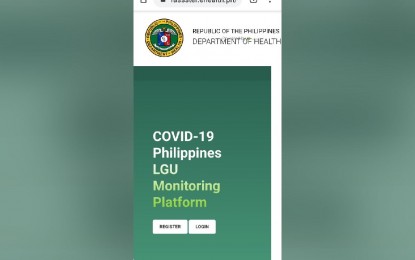
(Screenshot of the Covid-19 Philippine LGU Monitoring Platform)
MANILA -- The Department of Science and Technology (DOST) on Friday officially turned over the "Covid-19 Philippine LGU Monitoring Platform" called the Feasibility Analysis of Syndromic Surveillance using Spatio-Temporal Epidemiological Modeler (FASSSTER) to the Department of Health (DOH).
The FASSSTER app was developed by the Ateneo de Manila University (ADMU) for visualizing the spread of diseases, using data from the Philippine Integrated Disease Surveillance and Response (PIDSR) system, Electronic Medical Records, and SMS-based reports of primary care facilities.
In a virtual presser, DOST Secretary Fortunato de la Peña said this web-based disease surveillance platform could predict the peak of confirmed cases, peak date, case doubling time, and other relevant data which will facilitate understanding of the spread of coronavirus disease 2019 (Covid-19).
It could also forecast health system capacity requirements, based on the projected peak and quantity of mild, severe, and critical cases at the municipal, provincial, and regional levels, he added.
With these, he said FASSSTER could help determine the local government unit's epidemic risk level and appropriate strategy for Covid-19 response, based on case doubling time and critical care utilization rate.
"This will visualize social, economic, and security risk rating and classification of all cities and municipalities," said de la Peña, adding that FASSSTER also performs spatial analysis to determine the clustering of cases at the barangay level.
Health Undersecretary Lilibeth David said the team behind FASSSTER was able to guide the government with its decision plan.
Initially, FASSSTER was developed to visualize possible scenarios of outbreaks of dengue, measles, and typhoid fever.
DOST Undersecretary Rowena Cristina Guevara told the Philippine News Agency that the DOST funded the FASSSTER project with more than PHP4.8 million in 2016.
"It was an R&D (research and development) project. Then early this year, we asked them (ADMU researchers) to develop FASSSTER for Covid-19. It was finished last August 31. Since no more development is needed, it was turned over to the DOH," Guevara said.
"It is now the DOH that will give instruction to the FASSSTER team on what they want on the website," she added.
The intellectual property for FASSSTER, on the other hand, still belongs to ADMU.
The website is accessible to LGUs, but each LGU could only view its own record or data, according to Guevara. "Only DOH and allowed users can see all the LGUs," she said. (PNA)
The FASSSTER app was developed by the Ateneo de Manila University (ADMU) for visualizing the spread of diseases, using data from the Philippine Integrated Disease Surveillance and Response (PIDSR) system, Electronic Medical Records, and SMS-based reports of primary care facilities.
In a virtual presser, DOST Secretary Fortunato de la Peña said this web-based disease surveillance platform could predict the peak of confirmed cases, peak date, case doubling time, and other relevant data which will facilitate understanding of the spread of coronavirus disease 2019 (Covid-19).
It could also forecast health system capacity requirements, based on the projected peak and quantity of mild, severe, and critical cases at the municipal, provincial, and regional levels, he added.
With these, he said FASSSTER could help determine the local government unit's epidemic risk level and appropriate strategy for Covid-19 response, based on case doubling time and critical care utilization rate.
"This will visualize social, economic, and security risk rating and classification of all cities and municipalities," said de la Peña, adding that FASSSTER also performs spatial analysis to determine the clustering of cases at the barangay level.
Health Undersecretary Lilibeth David said the team behind FASSSTER was able to guide the government with its decision plan.
Initially, FASSSTER was developed to visualize possible scenarios of outbreaks of dengue, measles, and typhoid fever.
DOST Undersecretary Rowena Cristina Guevara told the Philippine News Agency that the DOST funded the FASSSTER project with more than PHP4.8 million in 2016.
"It was an R&D (research and development) project. Then early this year, we asked them (ADMU researchers) to develop FASSSTER for Covid-19. It was finished last August 31. Since no more development is needed, it was turned over to the DOH," Guevara said.
"It is now the DOH that will give instruction to the FASSSTER team on what they want on the website," she added.
The intellectual property for FASSSTER, on the other hand, still belongs to ADMU.
The website is accessible to LGUs, but each LGU could only view its own record or data, according to Guevara. "Only DOH and allowed users can see all the LGUs," she said. (PNA)
